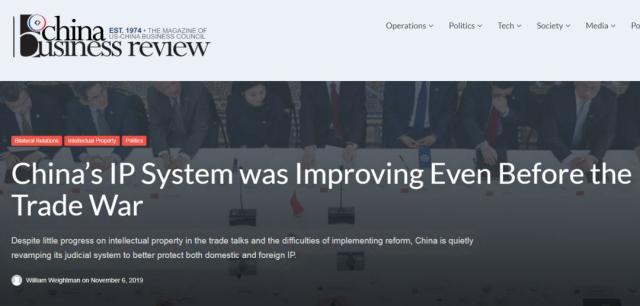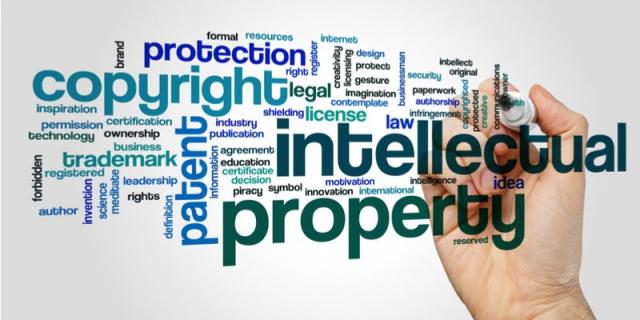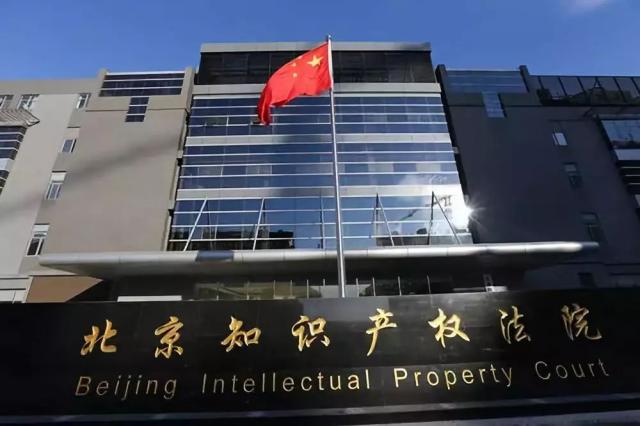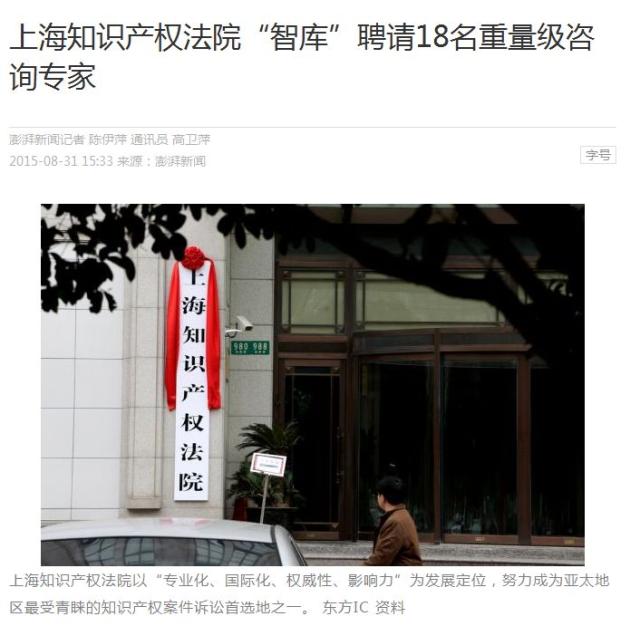美媒感慨:中国的知识产权保护,的确越做越好了
“在短短几十年里取得了长足的进步。”
(北京时间)今天下午,美中贸易全国委员会(US-China Business Council)的官方媒体《中国商业评论》(China Business Review)刊登了这样一篇文章:即使在贸易战前,中国的知识产权体系就已在改善。

文章的作者叫William Weightman,据介绍是Kobre & Kim LLP (美国高博金律师事务所) 的一名分析师,工作涉及政府执法、国防和中国等领域。("William Weightman is an Analyst at Kobre & Kim LLP where he works on matters involving government enforcement defense and China. " - via chinabusinessreview.com)
他还曾是一名富布赖特学者(指一项国际交流计划),在成都研究过中国的知识产权法、创新政策及司法改革。("Previously, he was a Fulbright Fellow based in Chengdu, China, where he researched Chinese intellectual property law, innovation policy, and judicial reform."- via chinabusinessreview.com)

在文章中他表示,就在最近几年,中国围绕知识产权制度进行了一系列的司法改革。他举例道:
In 2014, the Supreme People’s Court launched specialized IP courts in Beijing, Shanghai, and Guangzhou.
2014年,最高人民法院在北京、上海和广州设立了专门的知识产权法院。
Since 2017, they have also launched 18 specialized IP tribunals across China. While local courts used to hear IP cases as well, these new specialized IP courts and tribunals now have exclusive jurisdiction.
自2017年以来,他们还在中国各地设立了18个专门的知识产权法庭。虽然地方法院过去也审理知识产权案件,但这些新的专门的知识产权法院和法庭现在拥有专属管辖的职能。
The creation of the national-level IP appellate court, similar to the US Court of Appeals for the Federal Circuit, provides further central oversight over IP cases.
与美国联邦巡回上诉法院类似,国家层面知识产权上诉法庭的成立,为知识产权案件提供了更进一步的中央级监督。
▲China’s IP System was Improving Even Before the Trade War (via China Business Review)
作者坦言,曾经地方法院在审理知识产权案件时,或许存在偏袒当地企业等地方保护主义的情况,使得一些外商觉得不太公平。
但如今,地方有了具有专属管辖职能的知识产权法院/法庭,涉及知识产权的案件可以得到更高级别的关注和监督,“护短”的情况,就会大大减少。

在文章中,作者还特意提及,这些知识产权法院/法庭专门引进了权威专家人士,以提升审判的专业性和公平性:
In addition to court reform, China has also begun to introduce technical investigators, expert assessors, and specialized IP judges to its system. These experts are recruited from universities and research institutions and play an active role in court proceedings and assist judges with understanding complex technologies and scientific processes.
除法院改革外,中国还开始引进技术调查员、专家评审员和专门的知识产权法官。这些专家来自各大学和研究机构,他们在法庭程序中发挥着积极的作用,协助法官去了解复杂的技术和科学过程。
The specialized IP judges also have high standards for selection and must have at least 6 years of IP trial work experience. These reforms have strengthened the fact-finding capabilities of the courts and tribunals and have increased the level of professionalism and fairness of trials.
对专门的知识产权法官的选拔标准也很高,必须具有至少6年的知识产权审判工作经验。这些改革加强了法院和法庭的取证能力,也提高了审判的专业性和公正性。
▲China’s IP System was Improving Even Before the Trade War (via China Business Review)

▲澎湃新闻15年关于上海知识产权法院的报道 (截图via澎湃新闻)
此外,知识产权法庭/法院还在阻止侵权、保存证据、加大损害赔偿等方面不断做出提升。这些也都被作者所提及。("...such as the use of injunctions to stop infringement during court proceedings, more robust evidence preservation techniques, and increased damage awards.")
中国在知识产权保护上的改善有目共睹。上个月,美国《外交政策》杂志(Foreign Policy)也刊登过这样一篇文章:中国在知识产权方面的记录越来越好。
▲中国在知识产权方面的记录越来越好:中国正在从理念的净进口者向净创新者转型,而在转型过程中,它发现好的专利法律很重要 (via Foreign Policy)
China’s revision of its patent law as part of accession into the World Trade Organization in 2001 represented a major step toward compliance with international standards.
作为2001年加入世贸组织的一部分,中国修订了专利法,这是其向遵守国际标准迈出的重要一步。
Overall, China’s IP regime has made significant strides in just a few decades. Minimum damage payouts for violations have continually increased, as have durations of patent protection.
总的来说,中国的知识产权机制在短短几十年里取得了长足的进步。对违规行为的最低损害赔偿在不断增加,专利的保护期限也在延长。
Even the 2016 Special 301 Report by the generally bellicose USTR noted “[w]elcome developments” and “progress toward effective protection and enforcement of IPR in China.” China now ranks second globally (excluding tax haven countries) in annual spending on acquisition of foreign IP as well as in gross research and development expenditure.
就连一向好斗的美国贸易代表办公室在2016年的《特别301报告》中,也提到了中国“在有效保护和执行知识产权方面取得的进展”“值得欢迎”。目前,除去避税天堂国家外,中国每年用于收购外国知识产权的支出,以及研发支出的总额,均排在全球第二。
▲China’s Record on Intellectual Property Rights Is Getting Better and Better (via Foreign Policy)
这些改变,以及中国对于知识产权的重视,都不是最近才有的,更不是被所谓的贸易战给“逼迫”的。
努力优化营商环境,更好地保护知识产权——中国始终在这条道路上前行。
整合:lanlan
图:外媒、网络等




